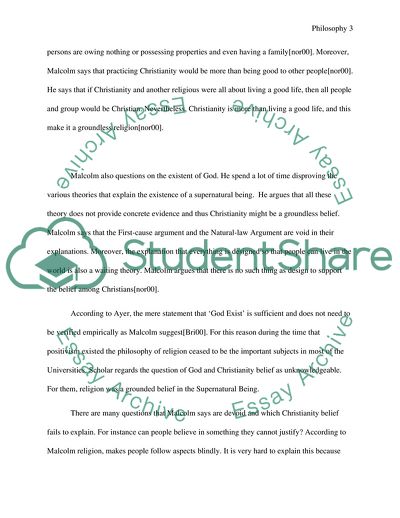Cite this document
(Religious Belief is Groundless Essay Example | Topics and Well Written Essays - 1500 words, n.d.)
Religious Belief is Groundless Essay Example | Topics and Well Written Essays - 1500 words. https://studentshare.org/religion-and-theology/1843690-what-does-norman-malcolm-mean-by-the-claim-that-religious-belief-is-groundless-is-his-theory-about-religious-belief-plausible-explain-your-answer
Religious Belief is Groundless Essay Example | Topics and Well Written Essays - 1500 words. https://studentshare.org/religion-and-theology/1843690-what-does-norman-malcolm-mean-by-the-claim-that-religious-belief-is-groundless-is-his-theory-about-religious-belief-plausible-explain-your-answer
(Religious Belief Is Groundless Essay Example | Topics and Well Written Essays - 1500 Words)
Religious Belief Is Groundless Essay Example | Topics and Well Written Essays - 1500 Words. https://studentshare.org/religion-and-theology/1843690-what-does-norman-malcolm-mean-by-the-claim-that-religious-belief-is-groundless-is-his-theory-about-religious-belief-plausible-explain-your-answer.
Religious Belief Is Groundless Essay Example | Topics and Well Written Essays - 1500 Words. https://studentshare.org/religion-and-theology/1843690-what-does-norman-malcolm-mean-by-the-claim-that-religious-belief-is-groundless-is-his-theory-about-religious-belief-plausible-explain-your-answer.
“Religious Belief Is Groundless Essay Example | Topics and Well Written Essays - 1500 Words”. https://studentshare.org/religion-and-theology/1843690-what-does-norman-malcolm-mean-by-the-claim-that-religious-belief-is-groundless-is-his-theory-about-religious-belief-plausible-explain-your-answer.


